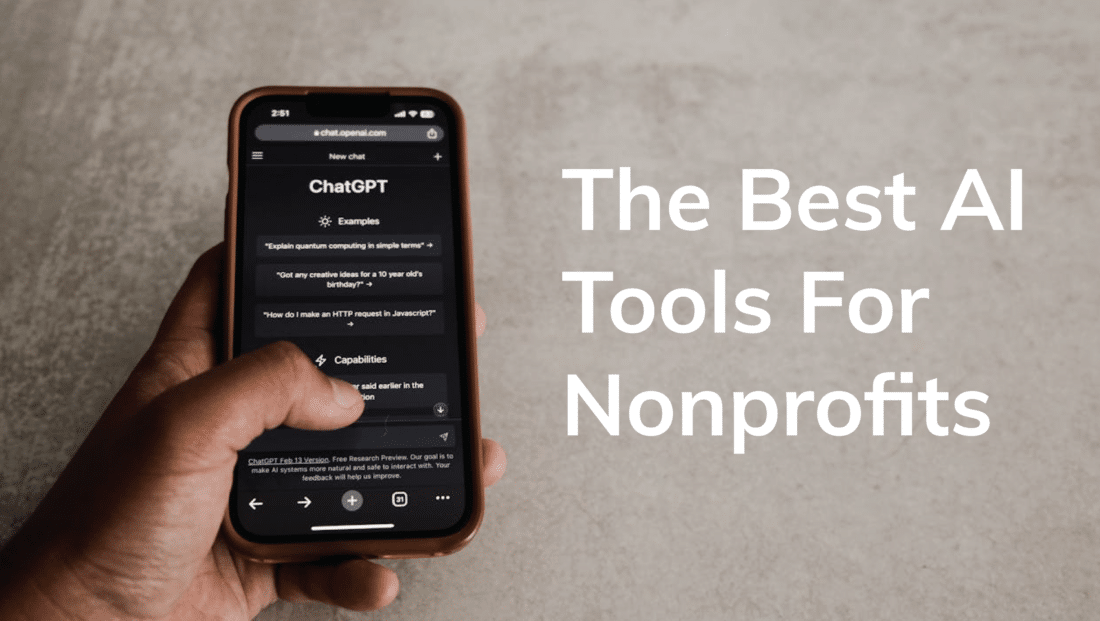
The Best AI Tools For Nonprofits
How Nonprofits Can Use AI
AI is quickly changing operations and capacity across industries. When it comes to nonprofits, AI can improve outcomes without straining resources by automating mundane tasks, personalizing outreach, improving donor engagement, and assisting with communication and productivity. In this overview, we’ll explore the best AI tools for nonprofits and learn how leveraging AI can help your organization achieve its mission more effectively and efficiently.
Improve Efficiency
Often operating with limited resources, AI can streamline various administrative tasks, automate repetitive processes, and free up staff time for more strategic planning and activities.
Marketing/Creative
Nonprofit fundraising is incredibly competitive, and standing out is crucial. AI-driven marketing tools can help create personalized content, optimize campaigns, analyze audience engagement, and even help brainstorm new ideas.
Data Analytics
Making sense of data within a nonprofit can be challenging, but AI tools can provide valuable insights into donor behavior, campaign performance, and program impact.
Customer Service
Nonprofits can lighten their workload by using AI chatbots and virtual assistants to handle inquiries, provide information, and enhance engagement around the clock.
Fundraising
Fundraising for nonprofits is essential. AI tools can help identify potential donors, personalize outreach, and optimize strategies to maximize contributions.
Making sense of data within a nonprofit can be challenging, but AI tools can provide valuable insights into donor behavior, campaign performance, and program impact.
AI Tools for Nonprofits
Data Analytics Tools
- Tableau – Tableau is a powerful data visualization tool that helps organizations visualize and process their data. It also allows nonprofits to create interactive, shareable dashboards and gain insights into their donor data.
- Looker – Looker is a data platform that provides real-time data access and business intelligence. It offers powerful analytics and visualization tools to help nonprofits make data-driven decisions.
- Snowflake – Snowflake is a cloud data platform providing data warehousing, sharing, and analytics capabilities. It allows nonprofits to store, analyze, and share large volumes of data more efficiently.
Generative AI Tools
- ChatGPT – This AI model can help nonprofits create briefs and outlines, draft content and emails, and develop interactive chatbots for supporter engagement. And now, OpenAI for Nonprofits is a new initiative to enhance the accessibility of nonprofit AI tools. Learn more and sign up here.
- Gemini – Gemini is a versatile platform developed by Google DeepMind. It is designed to process and generate responses from both text and images. Nonprofits can use it for content creation, data crunching, grant writing, and more.
- Grammarly – Grammarly provides suggestions for grammar, punctuation, style, and tone and can ensure that all written communications are polished and error-free.
AI Tool for Fundraising and Donor Engagement
- Salesforce Nonprofit Cloud – This AI-driven CRM platform helps manage donor relationships, track fundraising efforts, and optimize outreach strategies.
- DonorSearch – This tool uses AI to analyze donor data and identify potential high-value donors, helping nonprofits focus their fundraising efforts more effectively.
- HubSpot – This marketing automation tool uses AI to create targeted fundraising campaigns, track engagement, and optimize outreach efforts for better donor engagement.
AI Tools for Customer Service and HR
- Zendesk AI – Zendesk offers AI-powered customer service solutions, including chatbots and automated ticketing systems to handle common questions and support requests.
- Ada – This AI-powered chatbot automates customer service interactions by providing instant responses to common questions.
- BambooHR – This tool features AI-driven HR solutions for recruitment, performance tracking, managing employee data, and more.

AI Tools for Meetings and Productivity
- Microsoft Co-Pilot – This tool can help nonprofits by streamlining workflows and freeing up staff time. It can help tailor email outreach based on donor interests, generate drafts for grant proposals and reports, and provide suggestions for volunteer communication.
- Notion AI – This tool helps you write, brainstorm, and organize tasks within the Notion productivity platform. It combines note-taking with project management.
- Fireflies.ai – This tool records, transcribes, and analyzes voice conversations, so you don’t have to worry about taking notes. It also integrates with major video conferencing platforms and offers collaborative note-taking.
Marketing & Creative AI Tools
- Canva Magic Write – OpenAI powers this text generator to help you write faster and complete content creation tasks in seconds—from social captions to website copy to emails.
- Surfer SEO – Surfer SEO can help boost your organic traffic, increase visibility, and even improve rankings. By streamlining content creation and optimizing words to help capture more visitors, it’s a great marketing AI tool for nonprofits.
- Generative Fill – This tool is Adobe Photoshop’s new AI feature. It lets you remove and add new objects, expand images, and change entire backgrounds. It helps you spruce up an image quickly.
Best Practices for Implementing AI Tools at Your Nonprofit
Implementing AI tools can significantly enhance the impact of your nonprofit organization, but it’s important to use them ethically and wisely. Here are some AI best practices to maximize the benefits and ensure a smooth integration and outcome.
Overcoming Pitfalls of AI Adoption
When using AI tools, nonprofits may encounter common pitfalls like data privacy concerns, lack of expertise, and resistance to change. Some ways to overcome these challenges are:
Education and Training: Invest in programs to familiarize your team with AI and how they can use it to help the organization.
Data Privacy: Implement robust data privacy policies to protect sensitive information and build trust with your donors and supporters. Creating ethical, responsible use policies will ensure your organization stays human-centered.
Expert Consultation: Set up meetings with AI experts or partner with organizations in the space to navigate the complexities of AI.
Measuring the Impact of AI on Nonprofits
If you’re using AI tools to help your organization, that’s great! But to ensure they’re delivering what you hope they will, measuring their impact is essential. Some strategies for this are:
Define Key Metrics: Establish clear metrics to evaluate the performance of AI tools, such as efficiency improvements, donor engagement, and cost savings.
Feedback: Collect input from staff and other stakeholders to understand their perspectives and experiences using AI in their roles or to complete special tasks.
Program Outcomes: Analyze the impact of AI on program reach and various marketing initiatives.
Impact Reports: Create impact reports to communicate the benefits and wins of AI adoption to your board and donors.
Subscribe to our Media Cause newsletter to learn more about using AI in your nonprofit organization. If you need help with implementation or want more comprehensive nonprofit marketing support, check out our services!